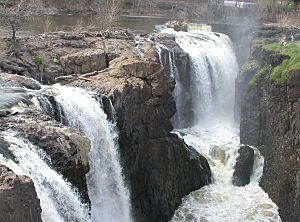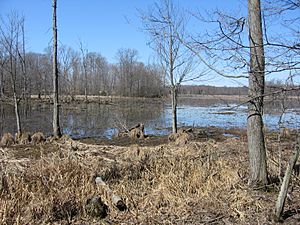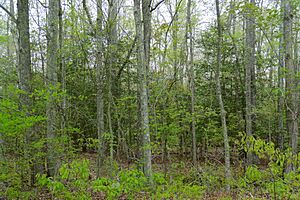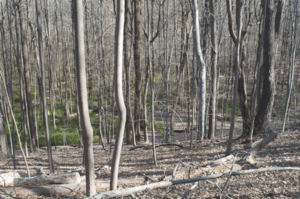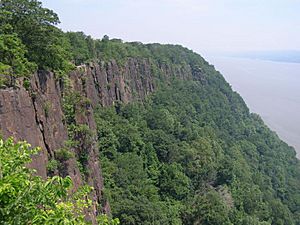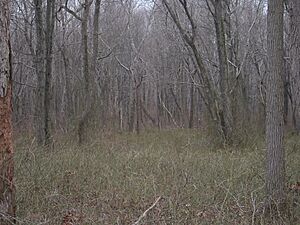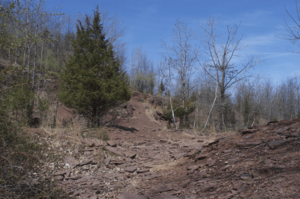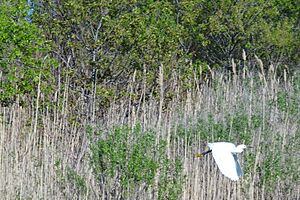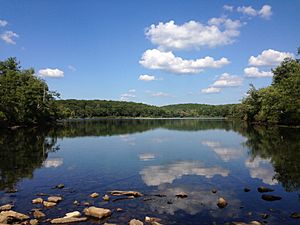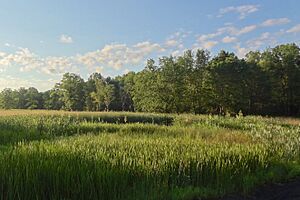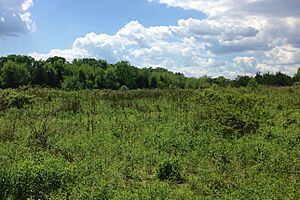List of National Natural Landmarks in New Jersey facts for kids
New Jersey is home to 11 amazing places called National Natural Landmarks! These special spots are recognized for their unique natural features. Many of them show us how powerful the Wisconsin Glacier was. This giant sheet of ice covered much of northern New Jersey long ago. When it melted, it created huge lakes like Glacial Lake Passaic, shaping the land we see today.
Exploring New Jersey's Natural Landmarks
New Jersey has a variety of natural landmarks, from towering cliffs to ancient forests and fossil sites. Each one tells a story about Earth's history and the incredible forces that shaped our planet.
Great Falls of Paterson-Garret Mountain
The Great Falls of Paterson-Garret Mountain is a powerful waterfall on the Passaic River in Paterson. This landmark shows how basalt rock, formed from ancient lava flows, shaped the area. Over millions of years, lava pushed up from deep inside the Earth. Then, water and ice carved out the dramatic landscape we see today. It's a great place to see geology in action!
Great Swamp National Wildlife Refuge
The Great Swamp in Green Village is a special place. It's what's left of the bottom of Glacial Lake Passaic. This huge lake formed when the Wisconsin Glacier melted at the end of the last ice age. Today, the Great Swamp is a National Wildlife Refuge. It protects over 7,600 acres of land. In 1968, it became the first official wilderness refuge in the United States. This means it's kept as wild as possible.
Manahawkin Bottomland Hardwood Forest
The Manahawkin Bottomland Hardwood Forest is a wildlife area in Manahawkin. It's known for its old, tall trees that grow in wet, low-lying areas. You can find trees like American sweetgum, red maple, and black gum here. This forest is a great example of a healthy wetland ecosystem.
Moggy Hollow Natural Area
Moggy Hollow Natural Area in Far Hills is a narrow valley. This ravine was once an important outlet for Glacial Lake Passaic. When the Wisconsin Glacier blocked the lake, the water found its way out through this spot. It drained into the Raritan river. Today, Moggy Hollow is a nature preserve. It's a clear example of how glaciers can change the landscape.
Palisades of the Hudson
The Palisades of the Hudson are dramatic cliffs that run along the Hudson River. They stretch from Fort Lee to Rockleigh. These tall, rocky walls are a famous geological ridge. They were formed by ancient lava flows that cooled and hardened into columns. The Palisades offer amazing views and are a striking natural feature.
Pigeon Swamp
Pigeon Swamp is an undeveloped state park in South Brunswick. It has a mix of different types of forests, both on higher and lower ground. This area was once a major nesting site for passenger pigeons. Sadly, these birds are now extinct. The park remains an important natural habitat for other wildlife.
Riker Hill Fossil Site
The Riker Hill Fossil Site in Roseland is a super cool place! In 1968, over 1,000 tracks from Dinosaurs, other animals, and insects were found here. These tracks are from the Late Triassic and Early Jurassic periods, which was millions of years ago! It's like a giant ancient footprint museum, showing us what life was like when dinosaurs roamed New Jersey.
Stone Harbor Bird Sanctuary
The Stone Harbor Bird Sanctuary in Stone Harbor is a 21.5-acre nature preserve. It was once a very important place for herons and egrets to nest every year. While the bird populations have changed over time, it remains a protected area for many bird species. It's a peaceful spot to observe local wildlife.
Sunfish Pond
Sunfish Pond near Columbia is a beautiful pond formed by glaciers. It's a very popular spot for hikers in Worthington State Forest. The pond is also close to the Delaware Water Gap National Recreation Area. It's a great example of a pristine glacial lake, offering stunning natural beauty.
Troy Meadows
Troy Meadows in Parsippany-Troy Hills is a large freshwater marsh. It's special because it's one of the last big, clean freshwater marshes in the region. Marshes like Troy Meadows are important wetlands that provide homes for many plants and animals. They also help filter water and prevent floods.
William L. Hutcheson Memorial Forest
The William L. Hutcheson Memorial Forest in Somerset is a 500-acre nature preserve. It includes a very rare 65-acre section of old growth forest. This means the trees in that part of the forest have never been cut down! It's a living example of what forests looked like centuries ago. The forest is managed by Rutgers University and the Nature Conservancy, helping to protect this amazing natural treasure.
 | Chris Smalls |
 | Fred Hampton |
 | Ralph Abernathy |


